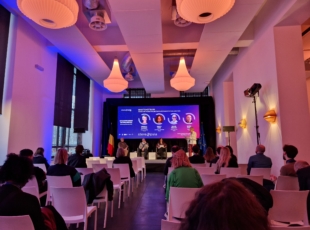Kris De Decker, off-grid publishing wins over hi-tech problems

Article author :
From science freelance journalist for Flemish news outlets to now being his own publisher, Low-tech Magazine’s founder Kris De Decker keeps a critical eye on how tech is being covered in mass media. He launched his online magazine in 2007 to highlight the potential of past and often forgotten technologies. Since then, he has turned it into a solar-powered website. Raising awareness on the always increasing energy demand required by content consumption.
Static web design, default typefaces, dithered images, off-line reading options, among other tricks to lower energy use far below that of the average website. You might already be used to these features if you ever tried kingkong’s low carbon version. As it uses so little energy, Low-tech Magazine’s website can operate on an off-the-grid solar panel system. All year long, this self-hosted installation hangs on the balcony of its creator Kris De Decker. ‘This means the website will go off-line during longer periods of cloudy weather’, he says.

At the start of our conversation, the website status displays a half-loaded battery. The shy morning sun has not reached his solar panel yet. Fortunately, the Belgian writer no longer lives in rainy Belgium but has found a new home in Catalunya’s capital. ‘In winter, Barcelona observes four times less sunlight than in summer. In Belgium, by the way, the difference lays around ten to twelve times less. The website has been running for the past six years now, and even if I clearly notice the seasonal effect, the system only goes completely off-line for 20ish days per year.’ Just as factories depended on the reliability and intermittency of windmills during the industrial era, this low-tech application on modern technology allows to rethink the question of energy demand in a time of instant gratification.
Back in 1996, the Antwerp-born journalist was mainly writing at local level for Belgian Dutch-language newspapers such as De Standaard, Knack or De Tijd. ‘I slowly specialised in science and tech. Like many of my freelance peers, I didn’t earn much from my papers. And I got really frustrated at how the media were unobjectively covering technologies. Have a look at the average science and tech pages. It’s usually about the newest iPhone. As if phones were the only things we consider as technology nowadays.’
Unable to get to the bottom of things and as technology was becoming such a prominent topic, De Decker thought: ‘Why don’t I write about technologies we forgot about, to take inspiration from the past and see if we can make tech solutions even better? It’s not like humans started using tech in the 20th century anyway. That’s how I came up with the idea behind Low-tech Magazine at first’, he recalls.
Hi-tech can be as high- or low-tech as you want it to be
Kris De Decker, journalist and founder of Low-tech Magazine
Since 2007, De Decker has been reporting on obsolete technology, high-tech problems versus low-tech solutions. The three sub-categories on the online magazine are full of in-depth and highly sourced papers on how to make wind power sustainable again, non-electric hearing aids outperforming modern devices, or more recently, how to escape from the iron age. The articles are also available in multiple languages thanks to his international team of translators. ‘Technology has become the idol of our society, but technological progress is aimed at solving problems caused by earlier technical inventions’, says his media’s manifesto. When Kris De Decker started Low-tech Magazine, his readership was highly critical towards his progressive approach to tech. ‘Hi-tech can be as high- or low-tech as you want it to be. But in the early days of the mag, readers had a hard time accepting the criticism I was addressing about high-tech processes not being sustainable. I could see it in the comments, but this has now changed. I’m considered way less controversial, and people also got more progressive about low-tech solutions.’

Making research work more accessible
At the very core of De Decker’s writing lies his drive to make academic research easy to understand for a larger audience. ‘Do you know anyone who’s reading academic papers? I don’t really. Nobody cares because this knowledge is highly complicated, and it’s usually not available to all. If journalists don’t make it a priority, the academic bubble won’t connect with civil society and ordinary people.’ He also regrets that research papers are usually locked behind paywalls. Which does not make it easy for journalists to access this academic content either.
It’s a shame this whole academic publishing world works like a mafia
Kris De Decker
On the advice of several researchers themselves, he admits he basically cracks all the academic pieces he needs to look up via Sci-Hub. A pirate library website providing free access to millions of research papers regardless of copyright, and bypassing publishers’ paywalls in various ways. Sci-Hub was founded in Kazakhstan by neuroscience-goer and computer programmer Alexandra Elbakyan in 2011, in response to the high cost of research papers. ‘When I can’t directly ask the authors for a copy of a research they conducted, I go on Sci-Hub. Academics or students working on their thesis use it a lot because usually, they only have full access to their own university’s database. It’s a shame this whole academic publishing world works like a mafia. They benefit from this monopoly-like position and ask insane prices to get access to these academic publications because they know universities and public institutions rely on them.’
Low-tech but high-quality
If a lot of work was put into the technical implementation of his solar-powered website, the same amount of sweat got into building a reliable community of readers from scratch. Not mentioning a viable model. ‘Still today, when I write and publish an article, I’m not really getting paid for it. I didn’t want to opt for a paywall system. I wanted my content to be accessible to anyone for free. In the long run, it brings me much more than when I’d publish a paper in a traditional newspaper.’
The first ten years, De Decker partly funded his work on Low-tech Magazine through advertising. He then got asked to take part in talks, he wrote books, and he also had a part-time job as a tour guide in Barcelona. But with his switch to a solar-powered online magazine in 2018, the writer had to rethink his income mix. ‘I let go of advertising because it became incompatible with the off-grid system. I was very happy about that. Quite naturally, Low-tech Magazine started to produce donations. I’ve learned over the years that focusing on high quality content really pays off to build a strong readership which will keep coming back. There’s so much info getting published out there. Making yourself out from other media takes a lot of effort, but it really matters.’


A story, projects or an idea to share?
Suggest your content on kingkong.
also discover

From Belgium to Japan, the new territories of creative digital creativity

Stereopsia, the key European immersive technologies hub

NUMIX LAB 2024: creating bonds and building the future of digital creativity


